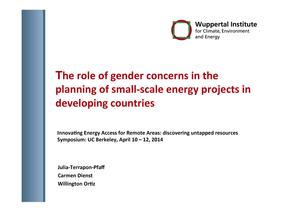The Role of Gender Concerns in the Planning of Small-scale Energy Projects in Developing Countries
The Role of Gender Concerns in the Planning of Small-scale Energy Projects in Developing Countries
Presenter: Julia Terrapon-Pfaff, (Wuppertal Institute for Climate, Environment and Energy GmbH,Germany)
Overview
|
Energy poverty affects women in developing countries more severely than it affects men; at the same time, women have less control over household resources and are often not involved in decision-making processes on energy matters. In order for transition processes of energy systems to be sustainable, these gender-related concerns need to be addressed. Although this link is widely recognized, gender aspects are still not well perceived in the planning of energy projects. To better understand the role of gender concerns in project planning, the research presented in this paper evaluates concepts of small-scale sustainable energy projects with regard to their gender sensitivity. The data originates from an expert evaluation process and was analyzed with focus on gender-related aspects. The results show that even in sustainable energy projects the issue is still not high on the agenda[1]. |
Issues Presented
► Please see the presentation.
- What role will gender play in the implementation of energy projects?
- MDG3: Promote gender equality and empower women; gender equality is a critical caveat of reaching sustainable energy –Access to energy was not an original development goal but will become one
- Women’s welfare is benefitted; time saved in daily tasks allows more time for education, less exposure to risk, and improved physical conditions
- Men often assume responsibility for decision-making, use patterns, and technology choice in the home
- Gender-sensitive energy projects and research are still the exception rather than the rule (Cecelski, 2004)
- How are gender concerns perceived in the design of small-scale energy projects in developing countries?
- Geographically, Latin America boasts the most gender-sensitive energy projects
- Data on the Middle East is statistically insignificant due to the small amt of projects implemented
- Various types of implementation are equal across project types
- Women should be cross-trained across new energy systems, not just traditional roles (ie: cookstoves)
- Not a significant difference across geographies or type of renewable energy project
- Will gender inclusion affect the sustainability of a project; do men and women spend new time differently (education or income generation), etc.
- Can the role of women change via energy projects?
References
- ↑ The role of gender concerns in the planning of small-scale energy projects in developing countries. Julia Terrapon-Pfaff, Carmen Dienst and Willington Ortiz.






















